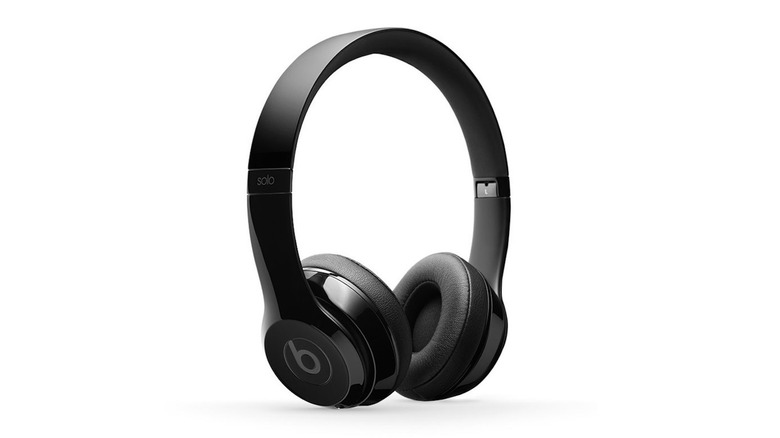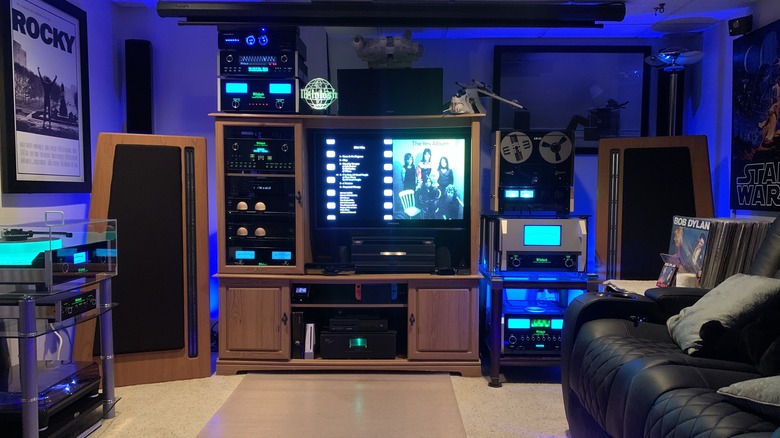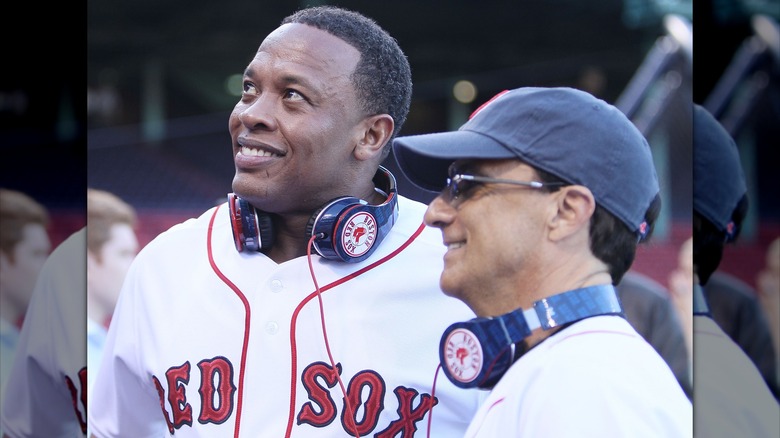Why Audiophiles Have Problems With Beats Headphones
As of June 2023, Apple holds a dominant slice of the market share of headphone sales in the United States. Apple-branded headphones account for 34.4%, while Beats, which Apple acquired in 2014, accounts for another 15.3% of the market, with a total nearly 50%. Except for Apple's $549 over-ear AirPods Max headphones, though, the Apple-branded headphones are not what's promoted as the company's higher-end option — the Beats line is. And those Beats headphones? They're pretty divisive.
In particular, self-styled audiophiles, or high-end audio devotees, really don't like Beats, and it's been the case for a long time. Some of their complaints have been rectified in recent years, but not all of them, to the point that Beats items are generally considered fashion statements more than high-end audio gear by the most discerning listeners. And though Beats headphones aren't intended to compete with audiophile-grade headphones, the high price point for Beats products means that consumers often compare them to entry-level audiophile headphones, regardless.
So, who exactly are these audiophiles, what do they want, and why are they not getting it from Beats?
What exactly is an audiophile in the first place?
Taken literally, an audiophile is just someone who loves sound, but in practice, the Merriam-Webster definition probably fits best: Someone "who is enthusiastic about high-fidelity sound reproduction." Realistically, though? It can get more than a little weedy and complicated.
Someone who's getting into vinyl records and making a point of getting a quality turntable and speakers to play them on can easily be considered an audiophile these days, as can someone listening to high-resolution recordings from streaming services like Tidal and Qobuz through the appropriate equipment. However, "audiophile" is often used as a bit of a dirty word, as spendier audiophiles are often derided for wasting money on minimal, barely discernable upgrades or peripherals advertised at improving fidelity that are outright scams. And when self-professed audiophiles claim to have "golden ears" that allow them to hear the smallest of differences, there are critics who will relish seeing them shown up.
Case in point: In 2022, the audiophile world was rocked by the revelation that specialty reissue label Mobile Fidelity Sound Lab (MoFi for short) had been deceptively promoting their vinyl releases as being produced using an all-analog production chain despite most of the company's recent releases being mastered from digital files. That MoFi was doing this while selling $100-plus "One-Step" records where they asserted that the quantity had to be limited to prevent wear to the master tape just made it worse, especially since many audiophiles couldn't tell that the records used digital sources. (This led to a class action lawsuit against MoFi, which the company settled.)
Long story short? "Audiophiles" exist on a broad spectrum.
But why don't audiophiles like Beats?
The main reason that audiophiles have long been sour on Beats headphones is that the sound quality isn't very good, especially for the price. More specifically, Beats had a distinct sound signature instead of providing a flat frequency response that accurately represented all ends of the sound spectrum. High-end/audiophile brands and some brands with headphones of different price points and quality levels, like Sennheiser, do this quite well. But Beats emphasized the low end of the spectrum, especially the bass. And it didn't even do that particularly well.
"Many audiophiles would have you believe Beats are bad because [they] have too much bass," wrote LifeHacker's Whitson Gordon when answering a reader question about Beats in 2014. "I disagree. It's that they have too much low-quality bass, with even worse mids and treble. If you want to hear what Beats sound like, pull up your equalizer and ram the midbass frequencies up. Hear that loud, boomy, awful noise? That's what Beats sound like."
In a word? Beats headphones sounded muddy. Brands like V-Moda and Sennheiser were putting out what were effectively better versions of Beats — bass-emphasized headphones that didn't sacrifice sound quality or come off as overpriced. But according to Beats' Jimmy Iovine? It didn't matter. "We got dumped on by audiophiles on day one," Iovine told Inc. in 2014. "We wanted to recreate that excitement of being in the studio. That's why people listen." Your mileage may vary as to whether Beats accomplished this goal per se, but the company did create a brand that projected that image regardless.
These days, some Beats headphones are lauded for flatter frequency response, but was that ever the point of the brand to begin with?


